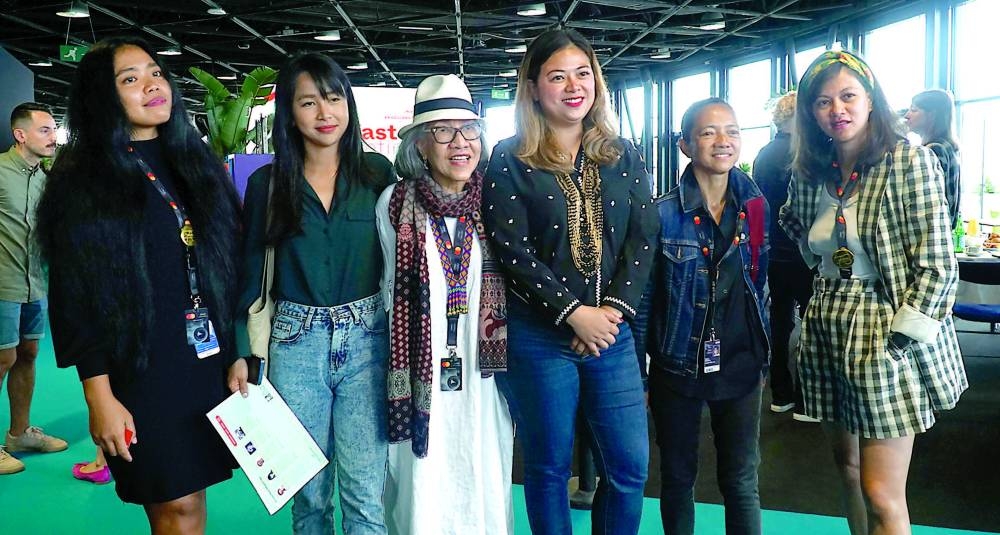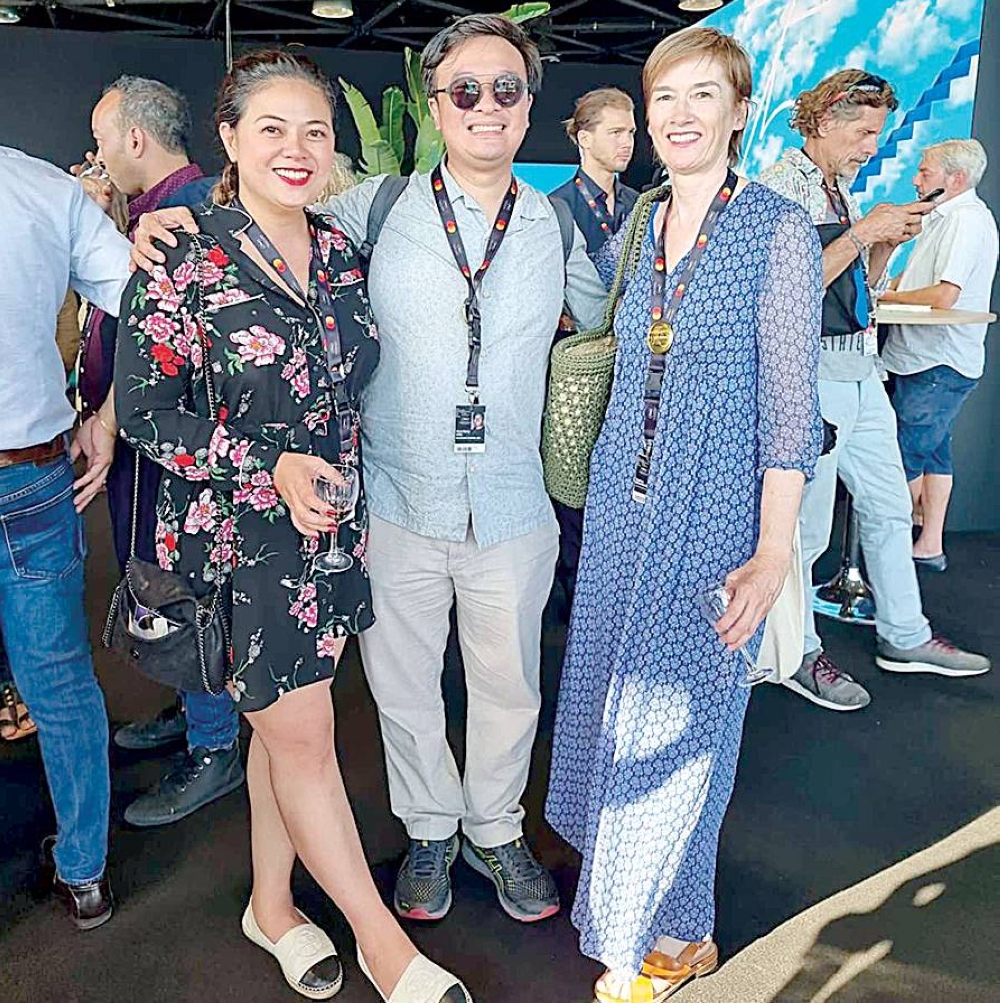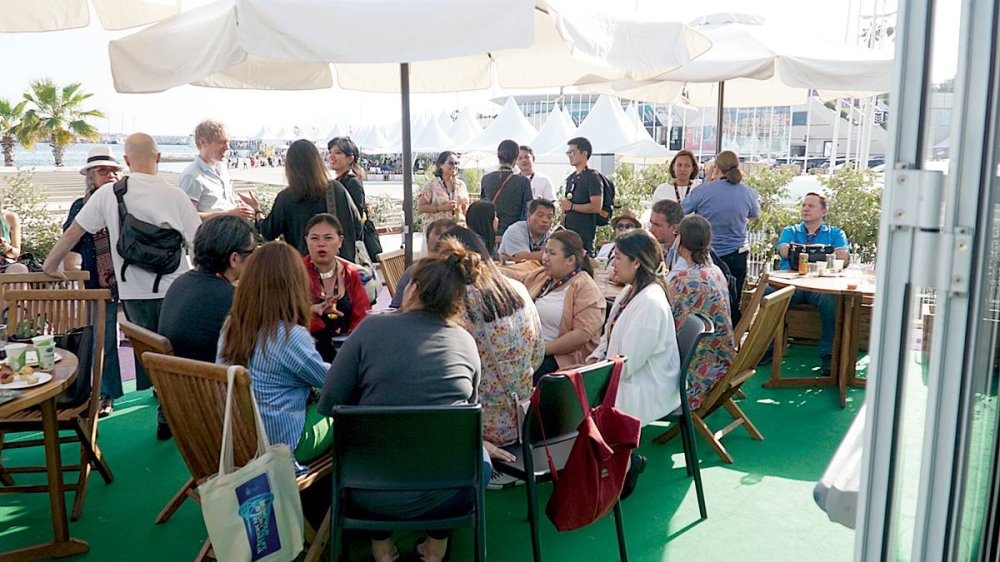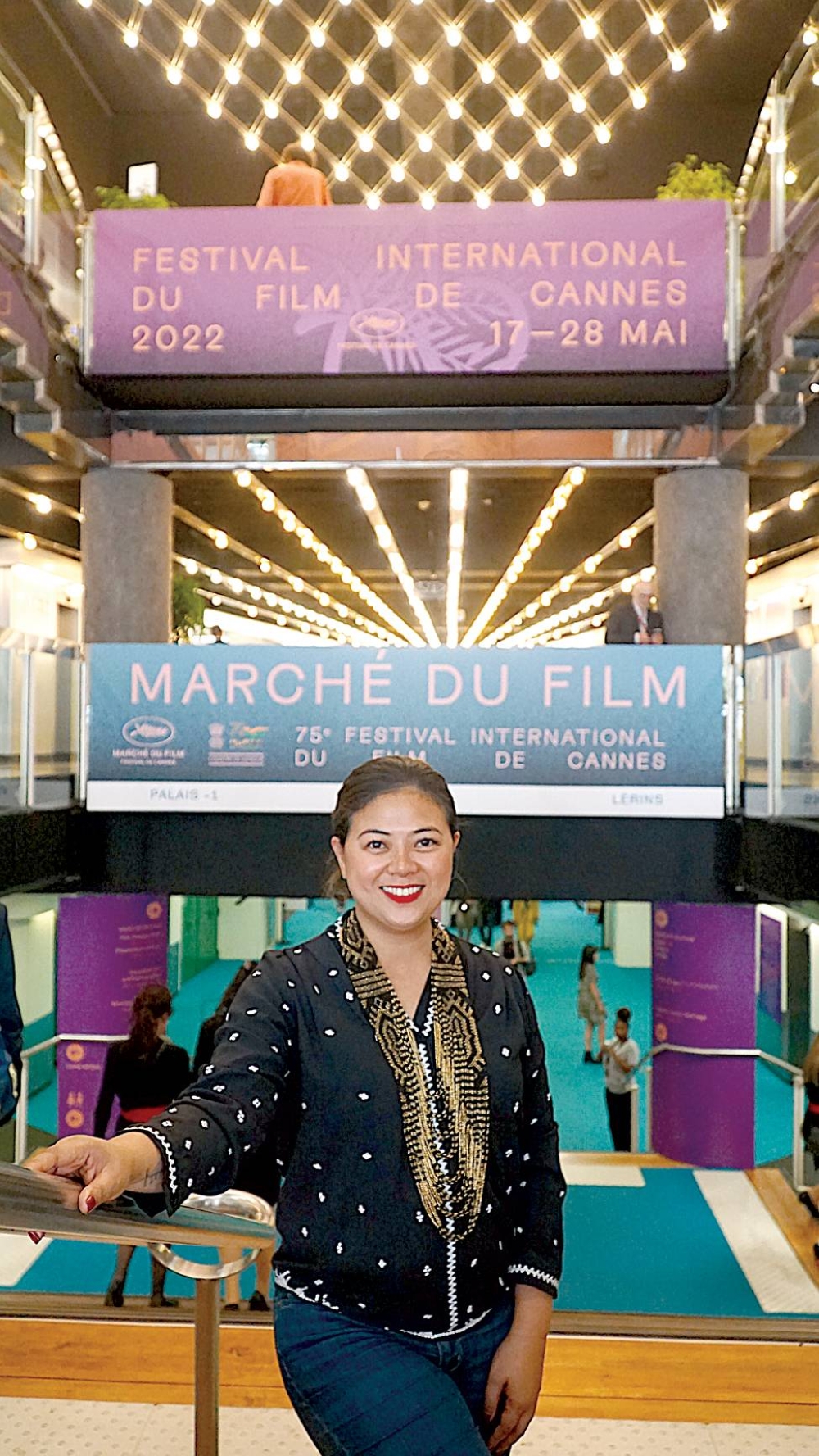The Philippines' diamond in Cannes
PHOTOS COURTESY OF FDCP'S MIGUEL MEJIA
CANNES, FRANCE: "Amazing" was the single-word reply of veteran global cinema executive, Sophie Bourdon, to The Sunday Times Magazine's lone question on a scorching afternoon by the Cote Riviera.
It was Day 3 of the landmark 75th Cannes Film Festival, which just concluded this Saturday, May 28, and alongside the multi-nation gathering of pavilions at Du Village International, the Philippines was making waves in its extensive and impressively prepared participation in the most prestigious film festival in the world.

Sophie Bourdon, the newly appointed head of Visions du Reel Industry — whose 30-year experience in organizing international film festivals has turned her into one of the most in-demand consultants across the international festival circuit — had just finished her scheduled meeting with Undersecretary Mary Liza Diño — the highly respected and much-loved chairperson of the Film Development Council of the Philippines (FDCP), not only at home but in this very global arena. They were eagerly discussing the possibility of the Philippines' participation in a documentary film festival called Visions du Reel in Switzerland in 2023.

"The FDCP will definitely support the community of documentary filmmakers back home should they want to send in entries. But we can also offer you our catalog of docus from as early as the 1900s for special screenings," Diño excitedly told Bourdon. "As you know, we celebrated the centennial of Philippine Cinema in 2019, and we're very proud of our filmmakers' masterpieces then and now."

Allies in advocating a truly global cinematic industry since they first met five years ago, Bourdon had no doubt her fellow dynamite would make her promises happen and, following a hug, reluctantly let Dino take her next meeting.
"Marami pa po kasing nagpa-schedule ng meeting with Chair Liza even before we left Manila. And ang dami pa rin pong nagpapalista since she arrived in Cannes," Ria Rubia, Executive Director of FDCP, whispered to The Sunday Times Magazine. "Ganito po talaga si Chair dito, back-to-back-to-back ang mga meetings niya. Mula 8 a.m., aabot pa siya ng 2 in the morning."

Quickly cornering Bourdon, it was then The Sunday Times Magazine began investigating this astounding popularity of Philippine Cinema and its key advocate, Chairperson Diño. The question begged to be asked of one of the longtime movers and shakers of global cinema. "Ms. Bourdon, how would you describe the work of FDCP under Chair Liza's leadership since first meeting her in 2017?"
With the same energy she met Diño with, Bourdon was definitely the perfect resource person in understanding why the Philippines seems to be the darling country at Cannes.
A witness to Diño's unwavering diligence in bringing Filipino movies to the radar of film industries worldwide, big or small, "amazing" was clearly the most appropriate word Bourdon could use in describing this phenomenon.

Back then, Diño was just a year into her appointment as head of the FDCP, while Bourdon was already and prominently Deputy Director of the Locarno Pro program of the Locarno Film Festival.
Yet it was apparent the French and Swiss cinema veteran was very much in awe of the Filipina actress-turned-government worker.
"You know, Liza achieved what her counterparts in other countries took 20 years to establish for their respective cinemas in festivals like Cannes, Locarno, and Busan in five years. These are the biggest film festivals worldwide, of course, and I can confirm that the Philippines' presence across all these is very prominent."
The Sunday Times Magazine needn't ask Bourdon any follow-up questions moving forward. She was only too happy to share her assessment of the Philippine Cinema's impressive international performance in the last five years.
"You know how Liza did it? First of all, she opened these opportunities to all filmmakers in the Philippines for the first time. Because before then, just like what usually happens in so many other countries, it is the same filmmaker or producer that is given the chance to come to Cannes."
Very limiting indeed on both sides of the equation, what Bourdon said verified Diño 's earlier narrative on the first steps she took as FDCP chairman back in 2016.
"I'm so happy to see how Philippine Cinema continues to make its mark on the global stage, with the younger filmmakers finally able to participate in these career-changing opportunities," Diño, a columnist for this publication, had said before. "But it wasn't always like this.
"When I joined FDCP, the first thing I asked for was the agency's criteria to decide who deserves to be given grants for their movies. Nagulat talaga ako nung sinabi nila sa akin na walang clear guidelines to assess whom to support toward breaking through the international market," she added in disbelief.
"Sabi ko, mapapahamak tayo if we carry on with that practice. Grants are government funds kaya dapat open siya sa lahat at may proseso."
While Diño quickly earned the ire of age-old cliques in the local industry, her move toward inclusivity among directors and producers resulted in the ending of a long lull in the country's impact when joining international festivals.
"Karamihan ng filmmakers sa atin lalo na yung baguhan ay hindi nakakaalam na pwede pala silang tulungan ng gobyerno with their projects. As I carried on getting the word out, we realized that even Filipino filmmakers natin based abroad knew nothing about the work of FDCP and were eager to belong."

[A separate source told The Sunday Times Magazine that for the longest time, established cliques would keep such information to themselves and thereby contain the opportunity of participating in festivals to themselves — Ed].
"So now, as you can see, the Philippines is co-producing with other countries and winning awards again because new talents have been given this platform which they should have had all along," Bourdon happily encapsulated Philippine Cinema's undeniable success in Cannes and many other important global platforms.
"And I tell you, it isn't easy to do. It usually takes years and years for industries to be honestly inclusive and united in the international circuit. Liza was able to do it in record time because this has never been a job for her. We [in the international community] are witness to her passion for the Philippine Cinema to succeed. That is why many of our counterparts — whether from established or smaller cinemas — are inspired by her boundless energy and always willing to help her."
Continuing mission
Despite taking such major leaps in bringing awareness to Philippine Cinema in the international community, Diño knows her mission as FDCP head still has much to achieve.
Heading a 32-strong delegation of Filipino and Filipino American producers, directors, and actors at Cannes, Diño, along with her bright and diligent staff of millennials, unitedly continued one of FDCP's most essential mandates to promote Philippine Cinema abroad.
Among these equally impassioned stakeholders are partner producers Alemberg Ang and Wilfredo Manalang, who invested in the Un Certain Regard official selection from Japan, "Plan 75," which also features Filipina actress Stephanie Arianne in a principal role among the cast.
Then, there is the seasoned Filipino thespian Dolly de Leon, who brings the house down at every screening of a multi-country co-production titled "Triangle of Sadness."
Both these actresses' roles were written into the foreign productions with a clear effort to showcase Filipino culture at its best—FDCP is likewise available to assist in this objective. So besides showing in their respective movies how far Filipinos will sacrifice working abroad to support their families, Arianne also demonstrates the sympathy and readiness of the Filipino to help others, whoever and whatever nationality they may be. At the same time, de Leon embodies the Filipino's intrinsic courage and pride in relation to their worth.
Albeit starring in extremely different genres, Arianne and de Leon's roles effectively and compellingly show the world that Filipinos are very talented creatives and at the same time, convey that we may be very amiable and principled people, but we will never be pushovers no matter the situation.
Two other sets of delegates comprised directors and producers participating in the festival's La Residence and L'Atelier components.
In La Residence, director Arvin Belarmino was a triumph for his dark but socially compelling movie, "Ria," copping the main CNC (Cannes Residency Pitch) Award during the Cinefondation Residency Program.
A proud "FDCP baby," he recalled to The Sunday Times Magazine how he started his dream of becoming a filmmaker from nothing only to find fair and inclusive supporters in Dino and her agency.
Genuinely talented, despite having no formal film degree, he sought the guidance of FDCP in bringing his short films to the world and has since won recognition abroad.
In 2017, Belarmino won the Best Fiction Film award at the 3rd Minikino Film Festival in Jakarta, Indonesia, for his debut short, "Nakaw;" and in 2020, the Berlin Brandenburg Best Film award at the 36th Interfilm Berlin Short Festival.
Meanwhile, among the selected Filipino Film projects chosen for the L'Atelier component were director E del Mundo and producer Pamela Reyes' "Sam" and director Sien Lyan Tun, again with producer Alemberg Ang's "The Beer Girl in Yangon."
Still among the delegates were producers and marketing heads of Filipino companies eager to go international. At Cannes, they were exposed to the major players of world cinema and were given the green light to find distributors, co-producers, and other investors for their projects.
All paying for their own way to Cannes, most prominent in this set were husband and wife Art and Sylvia Sanchez-Atayde, who, with the heads of their dual production outfits [Marj So for Feelmaking Productions and Grace Ann Casimsiman for Nathan Studio], were able to sit down with very promising partners for the international release of the powerful family drama, "Hey Joe," headlined by award-winning Filipino actor Arjo Atayde.
"Thanks to Chair Liza and the FDCP, we are being guided on how to properly penetrate the international market," Sanchez-Atayde, a highly respected and widely acclaimed Filipino actress herself, shared with The Sunday Times Magazine.
"If and when something comes out of this, sana ma-realize talaga ng Filipino filmmakers and producers na binuksan na ng FDCP ang daan para sa atin to make it internationally. It's time to go beyond saying, 'Kaya natin ito.' Gawin na natin because every Filipino movie entity, big or small, has the right to seek FDCP's help."
Last but not least among the Philippine delegation to Cannes was the festival-approved gathering of the most active and determined Filipino producers and directors who continue to bring their titles to the world market following their success in past international film festivals.
They are Joyce Bernal and E del Mundo of Spring Films, Inc.; Carlo Valenzona of Catchlight Pictures Indonesia; Pamela Reyes of Create Cinema Inc. of the "Bird Shot" fame; US-based Cecilia Mejia for Remedias Productions.
Former mainstream movie comedienne Evelyn Vargas who is now based in Switzerland also joined the Producers Spotlight with daughter Bianca Zialcita and had the opportunity to present their projects to movers and shakers of international cinema. Through their company, Vision Capture Media, the Vargases are grateful to be able to pursue their commitment to bringing Filipino movies around the world, even from abroad.
"As you can see, this isn't about us — not the FDCP and certainly not about me," Diño — who quietly sat at a corner table with her team and representatives sent by the Philippine Congress and Senate to assess whether the agency deserves a bigger budget in the new fiscal year — accurately stated.
"This is about them, our delegates, and fulfilling the mandate of the FDCP all along. And that is to provide our creatives and investors the opportunity to shine and maximize their earnings on a global scale as they deserve."
Ultimate goal
Beyond being able to support the country's creative gems — be they already established or up and coming — in forging careers career in world cinema and benefitting from a broader market, Diño categorically told The Sunday Times Magazine that the ultimate goal of FDCP is to actively participate in generating as many jobs as possible for Filipinos locally and to significantly contribute to the growth of country's economy.
That is why always incorporated in every activity of the FDCP in Cannes is the offer of incentives programs to the world market. Dino, in consultation with the equally passionate and energetic Agathe Vinson — who, before joining FDCP, worked at the Ile-de-France Film Commission and the Marche Du Film in sales and marketing — effectively designed and put into motion FilmPhilippines. This is the incentives program of FDCP to entice international producers and productions to film in the Philippines via assistance in securing work permits and rebates based on their total production cost in the country.
"I am so grateful to my counterparts from the biggest cinematic industries for welcoming me and the Philippines into their fold," Diño related. "Early on, I learned that these legends in global filmmaking and distribution have this by-invitation-only organization where they share their respective country's best practices in keeping their film industries moving forward.
"I once met the head of this exclusive international group called BPX (Best Practices Exchange) at an event some years ago. His name is Katriel Schory and he's the head of the Israel Film Fund. I approached him to ask for help on how to get started in bringing our movies to the world and foreign producers to shoot in our country. He was so generous in his sharing, and there was no way for the Philippines to get to where we are right now in terms of global awareness if I didn't open my mind and heed the advice of those who had already succeeded.
"Humbly, I asked for Katriel's direction, and in the process of telling him the innovations I had put in place at FDCP back then, he got the consensus of the group to invite me as an official member. That's what I love about being in the company of these international film commissioners—no matter who you are or what you've achieved, everyone is eager to listen to our perspective too. So up until 2020, when we launched FilmPhilippines, we were the only member country who didn't have any incentives to offer!" the tireless FDCP chairman and CEO laughed.
"Today, especially now that we are also offering incentives, we continue to dialogue, and I am so grateful to them for consistently showing me the way to get our industry out there and thriving. I am also very honored to be the only Asian member in their esteemed group no matter the size of our industry compared to theirs, whose best practices are just as much appreciated by the rest."
Winning strides
Diño, whose appointment to head FDCP had just been renewed by President Duterte for another three years, is careful to keep her and her team's feet firmly planted on the ground despite effectively being Cannes' celebrated poster child for its accomplishments in the last five years.
Replying to The Sunday Times Magazine's remark that the Philippines is undoubtedly well-known and sought after in Cannes as well as other major global festivals, Diño shuns the credit for what the global community knows she achieved for FDCP. Instead, the undersecretary expressed, "More than anything, I am grateful for the significant strides the industry has made internationally and for the help of my generous counterparts in starting us on this long-overdue journey of Philippine Cinema. But in saying that, I will not and cannot claim at this point that we have arrived. Marami pa tayong gustong gawin at puwedeng ma-achieve if we unite behind this goal."
While there will always be critics, it is a fact that Diño has won the confidence of the majority of stakeholders in Philippine Cinema as well as critical partner agencies in the country towards this aim. Nevertheless, the chairperson makes sure she keeps in mind a reality bites moment she experienced early in her post.
"This story is what keeps me grounded and motivated in heading the FDCP. One time, I went to the Department of Budget and Management (DBM) with my motherhood but sincere statements on the need to support Filipino movies. As I asked for more money for the FDCP, this highly respected official at DBM told me, 'I want you to know that the FDCP is the smallest agency in the entire Philippine government and has long been considered an expense.' She said she wasn't trying to put me down but hoped that her revelation would challenge me. Challenge me to find it within myself to really go for it and do more than just shout out the industry's battle cries."
Like most if not all endeavors in this world, it was a turning point for Diño to realize that even at the FDCP, it all boils down to numbers. She clearly understood then and there that if the FDCP would like a bigger budget, the agency should tangibly prove to the government that her dynamic model will indeed yield results.
"A creative myself, I had to think beyond the art and beyond its power to dissect the human existence, reflect its truths, and redeem it. I had to put first and foremost the good of the country before the industry and devise programs that will make an impact on the economy."
True enough by being very prudent with their meager budget — even if it means taking long haul flights seated at the rear of the plane and budget AirBnBs when out on a mission like this — the FDCP chairman and CEO has already planted the seed of promise of the movie industry amid national interest.
"When I was given a budget of P50 million for FilmPhilippines incentives in 2020, I brought it back to the DBM with a 1Billion income through our projects [refer to Notes from the Chair column on page 4]. So now, I'm happy to say that they are slowly coming around to what we in the movie industry have known for a long time already. That hindi lang tayo 'showbiz' but, if given proper support by the government, we can be what Korean Entertainment is to their government.
"We will bring home the awards for sure but bago pa tayo makauwi, panalo na rin ang Pilipino."
Postscript
Given all this good news from Cannes for the local movie industry and the rest of the country amid a new beginning in government, there may remain doubters who would like to demand justification why The Sunday Times Magazine has likened FDCP Chairman and CEO Liza Diño to a diamond at the Cannes Film Festival.
Keeping in theme with the 75th or Diamond Anniversary, not only of this prestigious global event but, serendipitously, the 75th year of French-Filipino ties, Diño shines like the most precious of stones too in her performance as the champion of Filipino movies today. For just as the Cannes Film Festival returned with fortitude two years after a crippling pandemic and valuable relation between the Philippine and French governments continues to flourish [even in the realm of cinema, of course], Mary Liza Diño has unquestionably led the FDCP in achieving unprecedented success in the international stage. Therefore, she should be celebrated like our winning movies, the enduring Cannes Film Festival, and the thriving friendship of the Philippines and France for being a diamond—a precious piece of charcoal that overcomes all forms of external adversities in its journey toward strength and longevity.
Mabuhay Usec. Liza Diño! Mabuhay FDCP! Mabuhay ang Pelikulang Pilipino.
Source: TheManila Times



No comments: